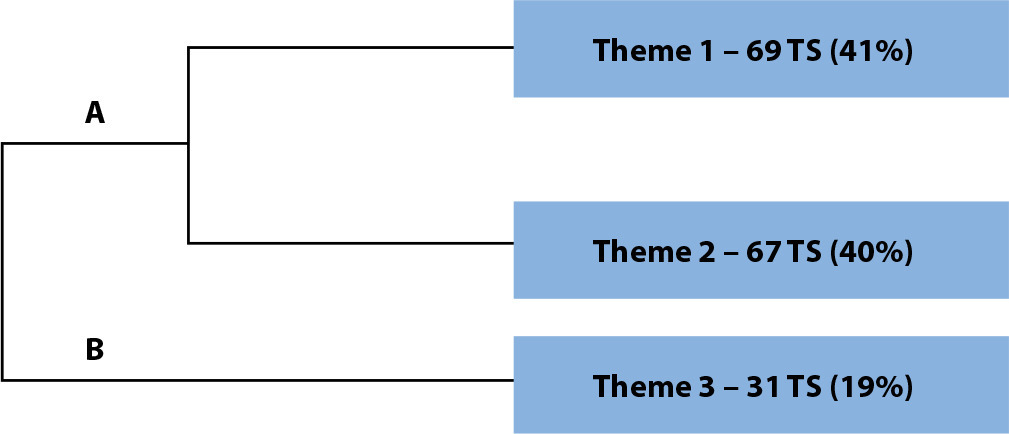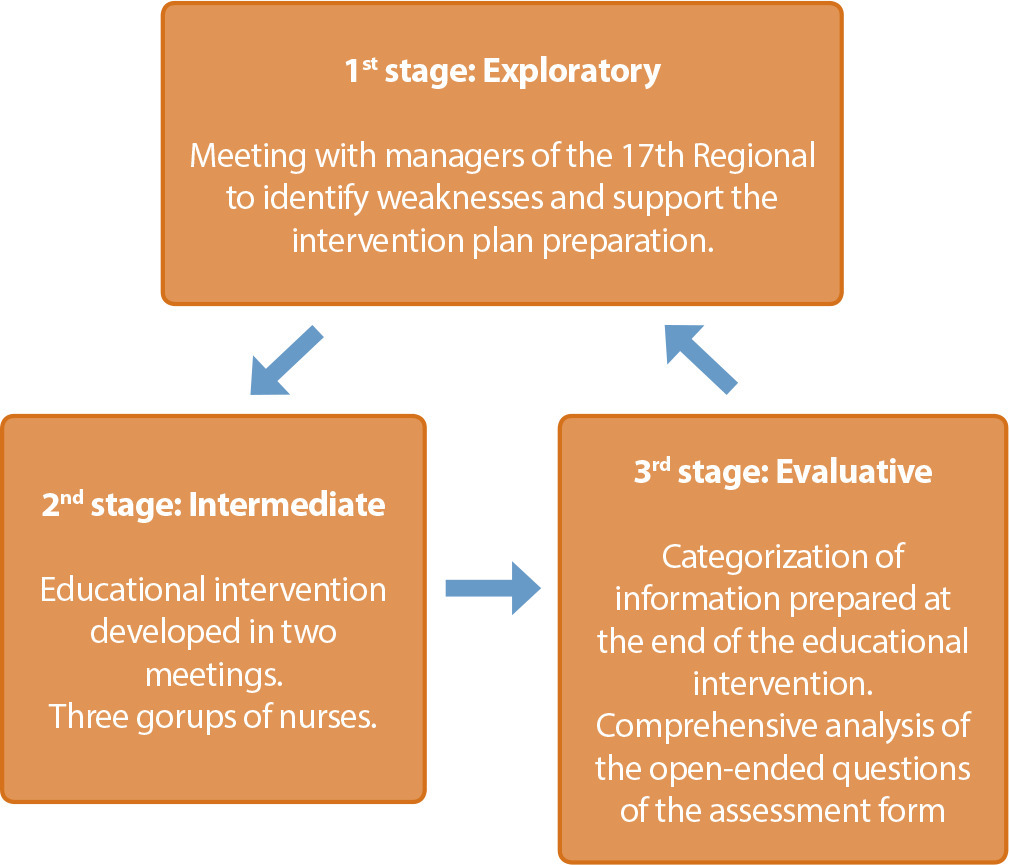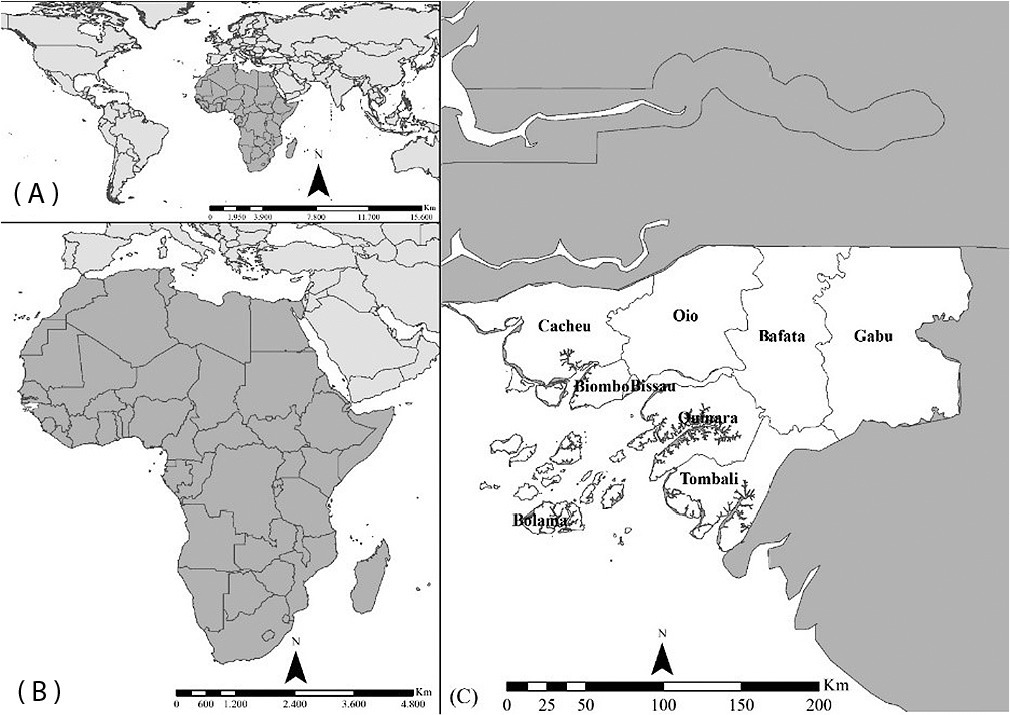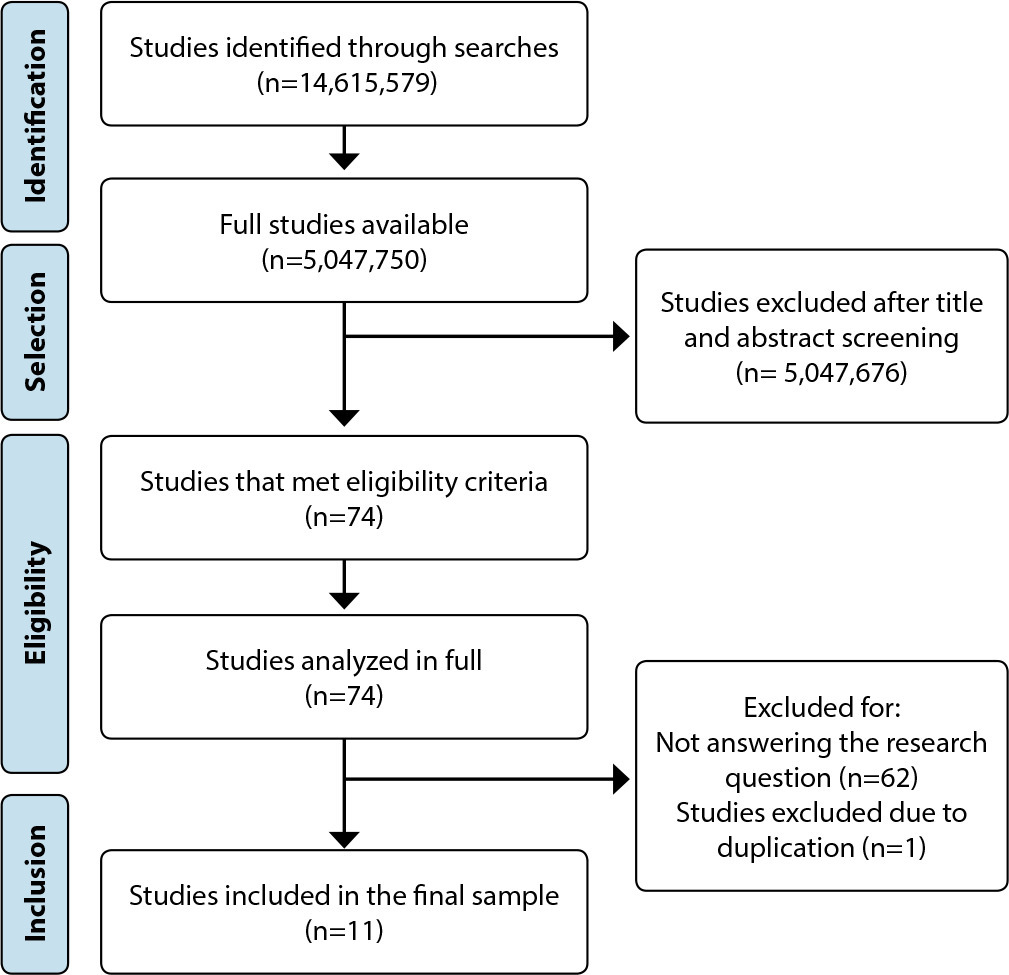-
01-01-2016
Discoveries of Biological Sciences and their implications for nursing practice
Revista Brasileira de Enfermagem. 2016;69(4):619-620
Abstract
Discoveries of Biological Sciences and their implications for nursing practice
Revista Brasileira de Enfermagem. 2016;69(4):619-620
DOI 10.1590/0034-7167.2016690401i
Views1For the longest time, the production of knowledge in the field of biological sciences was viewed as the exclusive responsibility and competence of medical professionals. This scenario has changed in light of the worldwide trend of improvements in other health professions, which includes the need to implement the use of evidence-based methodology in nursing practice. […]See more -
01-01-2016
Descobertas das Ciências Biológicas e as implicações para a prática da Enfermagem
Revista Brasileira de Enfermagem. 2016;69(4):619-620
Abstract
Descobertas das Ciências Biológicas e as implicações para a prática da Enfermagem
Revista Brasileira de Enfermagem. 2016;69(4):619-620
DOI 10.1590/0034-7167.2016690401i
Views1A produção de conhecimento na área das ciências biológicas, durante muito tempo, foi vista como de responsabilidade e competência exclusivamente de profissionais médicos. Esse cenário alterou-se frente à tendência mundial de aperfeiçoamento dos demais profissionais de saúde, incluindo-se a necessidade de se concretizar a utilização da metodologia da prática baseada em evidência na atuação do […]See more -
01-01-2016
The importance of civilian nursing organizations: integrative literature review
Revista Brasileira de Enfermagem. 2016;69(3):610-618
Abstract
The importance of civilian nursing organizations: integrative literature review
Revista Brasileira de Enfermagem. 2016;69(3):610-618
DOI 10.1590/0034-7167.2016690326i
Views0See moreABSTRACT
Objective:
to identify and analyze evidence from studies about the importance of civilian nursing organizations.
Method:
an integrative literature review, for which searches were conducted in the databases LILACS, PubMed/MEDLINE, SciELO, BDENF, and Scopus.
Results:
sixteen articles published between the years 2004-2013 were selected, 68.75% of which were sourced from Brazilian journals and 31.25% from American journals.
Conclusion:
civilian nursing organizations are important and necessary, because they have collaborated decisively in nursing struggles in favor of the working class and society in general, and these contributions influence different axes of professional performance.
-
01-01-2016
Effects from acupuncture in treating anxiety: integrative review
Revista Brasileira de Enfermagem. 2016;69(3):602-609
Abstract
Effects from acupuncture in treating anxiety: integrative review
Revista Brasileira de Enfermagem. 2016;69(3):602-609
DOI 10.1590/0034-7167.2016690325i
Views0See moreABSTRACT
Objective:
to evaluate the scientific evidence that is available in the literature on the effects of acupuncture for treating anxiety and on the quality of such studies.
Method:
the study is an integrative review of CINAHL, LILACS, PUBMED-PICO, SciELO, and The Cochrane Library between 2001 and 2014. Keywords anxiety, acupuncture therapy, acupuncture, and anxiety disorders were combined among themselves to ensure a wide search of primary studies.
Results:
among 514 articles, 67 were selected to be fully read and 19 were included. Among these, 11 were found to have strong evidence levels. Among the six articles about randomized clinical studies, five were found to be of reasonable quality. Two studies used acupuncturist nurses to perform their interventions. Its results showed positive and statistically significant effects from using acupuncture for treating subjects with anxiety.
Conclusion:
acupuncture seems to be a promising treatment for anxiety; however, there is a need for improving the methodological quality of the research on this field.
-
01-01-2016
Palliative care and spirituality: an integrative literature review
Revista Brasileira de Enfermagem. 2016;69(3):591-601
Abstract
Palliative care and spirituality: an integrative literature review
Revista Brasileira de Enfermagem. 2016;69(3):591-601
DOI 10.1590/0034-7167.2016690324i
Views0See moreABSTRACT
Objective:
to analyze scientifi c articles published in international online journals about palliative care and spirituality.
Methods:
an integrative literature review with data collected in September 2014 from the LILACS, SCIELO, MEDLINE/PubMed, and IBECS databases.
Results:
thirty-nine publications were identifi ed and their textual analysis facilitated through four thematic approaches: the meaning of spirituality in the context of palliative care; palliative care and spiritual support; spirituality and relief of pain and other symptoms in patients under palliative care; and instruments to evaluate the spiritual dimension of the scope of palliative care.
Conclusion:
this study examined the relevance of the spiritual dimension in the care of patients with palliative care and the need for developing new studies to disseminate knowledge about this topic.
Descriptors:
Palliative Care; Palliative Care at End of Live; Spirituality; Religion; Health.
-
01-01-2016
Educational technologies to encourage (self) care in postpartum women
Revista Brasileira de Enfermagem. 2016;69(3):582-590
Abstract
Educational technologies to encourage (self) care in postpartum women
Revista Brasileira de Enfermagem. 2016;69(3):582-590
DOI 10.1590/0034-7167.2016690323i
Views0See moreABSTRACT
Objective:
to evaluate national and international literature regarding the use of educational technologies to encourage self care in postpartum women.
Method:
an integrative review of the literature. The articles were collected from the CINAHL, SCOPUS, PubMed, SciELO, LILACS and Cochrane databases; the time period for the articles referred to January/2004 to July/2014; the languages used in the articles were Portuguese, English, Spanish and French; the articles were selected from the following descriptors: postpartum care period, educational technology, nursing and self care. Twenty-seven articles were selected for analysis
Results:
based on the information found, the scales, counseling and home visits were among the most recommended educational technologies.
Conclusion:
the technologies promote communication, but are sometimes dependent on computer and internet access, which hinder their use by low-income women.

-
01-01-2016
Patients with HIV/Aids and ulcer risk: nursing care demands
Revista Brasileira de Enfermagem. 2016;69(3):574-581
Abstract
Patients with HIV/Aids and ulcer risk: nursing care demands
Revista Brasileira de Enfermagem. 2016;69(3):574-581
DOI 10.1590/0034-7167.2016690322i
Views0See moreABSTRACT
Objective:
to analyze the demand for nursing care and the risk of pressure ulcers (PU) of patients with HIV/Aids.
Method:
quantitative survey, carried out from December 2012 to March 2013 in a public hospital of Teresina, state of Piauí, Brazil.
Results:
the sample of 31 patients was predominantly male, mean age 36.6 years, average care demand 49.4%, most showing some risk of developing PU. The variables correlated with PU risk were care demand and clinical outcome (death). Those associated with care demand were age and clinical outcome (death).
Conclusion:
the results showed that patients require moderate nursing care needs and most of them present risk of developing PU.

-
01-01-2016
Lack of anticipated support for care for community-dwelling older adults
Revista Brasileira de Enfermagem. 2016;69(3):566-573
Abstract
Lack of anticipated support for care for community-dwelling older adults
Revista Brasileira de Enfermagem. 2016;69(3):566-573
DOI 10.1590/0034-7167.2016690321
Views0See moreABSTRACT
Objective:
to identify the factors associated with lack of anticipated support for care for community-dwelling older adults.
Method:
this study presents comparison and logistic regression analyses of data from 671 individuals who took part of the multicentric study entitled “Frailty in older Brazilians” – a quantitative, epidemiologic and transversal investigation carried out between 2008 and 2009.
Results:
the subjective evaluation of anticipated support for care for community-dwelling older adults was a good indicator of risk for lack of anticipated support for care in women, older adults who live alone and those with poor self-rated health.
Conclusion:
it is necessary to reflect upon the formal support system currently available for older people in Brazil, considering that those who most frequently presented lack of anticipated support for care are an increasing population. The study also highlights the importance of using subjective methods for the evaluation of the adequacy of older adults’ support network.
-
ORIGINAL ARTICLE10-09-2023
Construction and validation of a scenario for recognizing sepsis by nursing students: a methodological study
Revista Brasileira de Enfermagem. 2023;76(4):e20220537
Abstract
ORIGINAL ARTICLEConstruction and validation of a scenario for recognizing sepsis by nursing students: a methodological study
Revista Brasileira de Enfermagem. 2023;76(4):e20220537
DOI 10.1590/0034-7167-2022-0537
Views0See moreABSTRACT
Objective:
To build and validate a clinical simulation scenario for teaching Nursing students about early recognition of signs and symptoms of sepsis in the context of the emergency unit.
Methods:
Methodological study developed in two phases: construction of a simulated scenario and content validation by expert judges. For data analysis, the Content Validity Index (CVI) was calculated considering agreement equal to or greater than 80%. The minimum acceptable CVI value for scenario validation was 1.0.
Results:
The simulation scenario proved to be appropriate, with a global Content Validity Index equal to 1. Some adjustments related to the clarity of the wording were necessary, as suggested by the judges. Conclusions: A medium-complexity, high-fidelity scenario was successfully constructed and validated for teaching early recognition of sepsis signs and symptoms.
-
EXPERIENCE REPORT10-09-2023
Service organization protocol for coping with undergraduate students’ psychological distress: a collective construction
Revista Brasileira de Enfermagem. 2023;76(4):e20220535
Abstract
EXPERIENCE REPORTService organization protocol for coping with undergraduate students’ psychological distress: a collective construction
Revista Brasileira de Enfermagem. 2023;76(4):e20220535
DOI 10.1590/0034-7167-2022-0535
Views0See moreABSTRACT
Objective:
to report on the experience of the elaboration process of a service organization protocol for coping with public undergraduate students’ psychological distress in the countryside of São Paulo.
Method:
experience report on protocol production, an action research product, carried out according to the health care and service organization protocol model, made possible by remote meetings with 33 professionals linked to the management and services of the university’s health and social assistance departments.
Results:
collective protocol production provided an opportunity for an institutional agreement on educational, therapeutic and support actions, to be developed in groups or individually with students, with provision for permanent education with civil servants.
Final considerations:
this experience made it possible to list specific actions to face undergraduate students’ psychological distress, bringing health professionals closer to those in management, promoting the exchange of concepts and practices to re-signify and transform the work developed.
-
ORIGINAL ARTICLE10-09-2023
Performance of Family Health Strategy Nurses in LGBT+ Healthcare
Revista Brasileira de Enfermagem. 2023;76(4):e20220514
Abstract
ORIGINAL ARTICLEPerformance of Family Health Strategy Nurses in LGBT+ Healthcare
Revista Brasileira de Enfermagem. 2023;76(4):e20220514
DOI 10.1590/0034-7167-2022-0514
Views0See moreABSTRACT
Objective:
To analyze the role of Family Health Strategy (FHS) nurses in the health care of LGBT+ individuals.
Methods:
This qualitative study is based on Institutional Analysis. Data was collected in August 2021 through semi-structured interviews with 14 Family Health Strategy nurses from municipalities in the state of São Paulo. The data was processed using the IRaMuTeQ® software and analyzed lexically.
Results:
The textual corpus gave rise to three themes, which addressed the nurses’ practice, the difficulties and challenges they face in providing care to LGBT+ individuals, and the direct association of LGBT+ individuals with sexually transmitted infections.
Conclusion:
Lack of preparedness, access to information, and the need for expanded listening skills are still gaps in the performance of FHS nurses in caring for LGBT+ individuals. However, fostering acceptance and building strong relationships have been effective strategies in bridging the gap in nursing care for the LGBT+ community.

-
ORIGINAL ARTICLE10-09-2023
Perceived stress by mototaxi drivers and its relationship with sociodemographic and occupational characteristics
Revista Brasileira de Enfermagem. 2023;76(4):e20220505
Abstract
ORIGINAL ARTICLEPerceived stress by mototaxi drivers and its relationship with sociodemographic and occupational characteristics
Revista Brasileira de Enfermagem. 2023;76(4):e20220505
DOI 10.1590/0034-7167-2022-0505
Views0See moreABSTRACT
Objective:
To investigate the association of sociodemographic and occupational characteristics with a high level of perceived stress in motorcycle taxi drivers.
Method:
Cross-sectional study carried out with motorcycle taxi drivers who answered instruments on sociodemographic and occupational variables – Perceived Stress Scale, Job Content Questionnaire and Effort-Reward Imbalance. Descriptive statistics, Pearson’s chi-square test and Poisson regression with robust variance were used. Statistical significance was 5%.
Results:
Of the 800 motorcycle taxi drivers, 46.8% had a high level of perceived stress. In the multivariate analysis, a high level of stress was associated with low control over work (PR=7.76; 95%CI=5.19-11.61), low social support at work (PR=3.87; 95%CI =2.95 5.08), working hours longer than eight hours a day (RP=1.47; 95%CI=1.21-1.78) and monthly income less than or equal to two minimum wages (PR=1.34;95%CI=1.13-2.58).
Conclusion:
Long working hours, occupational stressors and low income were associated with a high level of perceived stress. Public policies and interventions to minimize occupational stressors are essential.
-
ORIGINAL ARTICLE10-09-2023
Educational intervention in social skills for Primary Care nurses
Revista Brasileira de Enfermagem. 2023;76(4):e20220503
Abstract
ORIGINAL ARTICLEEducational intervention in social skills for Primary Care nurses
Revista Brasileira de Enfermagem. 2023;76(4):e20220503
DOI 10.1590/0034-7167-2022-0503
Views0See moreABSTRACT
Objective:
to assess an educational intervention on social skills for nurses who work in Primary Health Care.
Method:
a qualitative research-intervention study, carried out in the municipalities covered by the 17th Health Regional of Paraná. It was developed in three interrelated stages: exploratory, where meetings were held with the managers to define the groups and logistics for running the course; intermediate, developed in meetings with different groups of nurses, addressing selected topics; assessment, in which the nurses developed a personal plan to improve their social skills.
Results:
participants were 57 nurses who acted as coordinators of Primary Care. They considered the educational intervention in social skills fundamental for positive changes in their professional performance.
Final considerations:
the educational intervention in social skills was assessed as an important strategy to strengthen the development of nurses’ managerial and care skills.

-
ORIGINAL ARTICLE10-09-2023
Spatial and temporal analysis of tuberculosis incidence in Guinea-Bissau, 2018 to 2020
Revista Brasileira de Enfermagem. 2023;76(4):e20220481
Abstract
ORIGINAL ARTICLESpatial and temporal analysis of tuberculosis incidence in Guinea-Bissau, 2018 to 2020
Revista Brasileira de Enfermagem. 2023;76(4):e20220481
DOI 10.1590/0034-7167-2022-0481
Views0See moreABSTRACT
Objective:
to analyze the epidemiological profile, spatial and temporal distribution of tuberculosis in Guinea-Bissau from 2018 to 2020.
Methods:
an ecological study, carried out in Guinea-Bissau, considering new cases of tuberculosis. Spatial analysis of areas was used to verify tuberculosis distribution in the country, and time series were used to identify incidence evolution over the years of study.
Results:
a total of 6,840 new cases of tuberculosis were reported. Tuberculosis incidence rate in the country ranged from 36.8 to 267.7 cases/100,000 inhabitants, with emphasis on the regions of Bissau and Biombo (over 90 cases/100,000). By using time series, it was possible to observe an increase in case incidence over the years of study.
Conclusions:
the study made it possible to identify the epidemiological profile of tuberculosis in Guinea-Bissau, spatial distribution heterogeneity, in addition to identifying the disease evolution over the years of investigation.

-
ORIGINAL ARTICLE10-09-2023
Eating habits: what foods do children between 12 and 36 months consume?
Revista Brasileira de Enfermagem. 2023;76(4):e20220393
Abstract
ORIGINAL ARTICLEEating habits: what foods do children between 12 and 36 months consume?
Revista Brasileira de Enfermagem. 2023;76(4):e20220393
DOI 10.1590/0034-7167-2022-0393
Views0See moreABSTRACT
Objective:
to identify toddlers’ eating habits.
Method:
a cross-sectional study of quantitative analysis, with a sample of 808 toddlers who attended day care centers in the district of Viseu, Portugal, between November 2018 and September 2019. Data were collected using a questionnaire directed at parents.
Results:
the prevalence of children who ate six meals a day was 42.8%, and 42.5%, those who ate five meals. It was found that 2.0% of children consumed chocolates, 1.0%, desserts, and 0.4%, carbonated beverages, daily. On average, dairy product (M=5.61; SD=2.62) and meat/fish/egg (M=4.80; SD=3.57) consumption was higher than recommended, while fat (M=0.48; SD=0.40), legume (M=0.49; SD=0.45), vegetable (M=1.18; SD=0.87) and water (M=0 .51; SD=0.29) consumption was lower.
Conclusions:
there was a higher or lower consumption than recommended for some foods, highlighting the need to implement nursing intervention programs aimed at promoting healthy eating habits in toddlers and families.
-
REVIEW10-09-2023
Self-care guidelines for patients in the post-hematopoietic stem cell transplantation period: a scoping review
Revista Brasileira de Enfermagem. 2023;76(4):e20220383
Abstract
REVIEWSelf-care guidelines for patients in the post-hematopoietic stem cell transplantation period: a scoping review
Revista Brasileira de Enfermagem. 2023;76(4):e20220383
DOI 10.1590/0034-7167-2022-0383
Views0See moreABSTRACT
Objective:
To map the evidence on self-care guidelines for patients in the post-hematopoietic stem cell transplantation (HSCT) period.
Method:
Scoping review supported by Joanna Briggs Institute recommendations, with searches conducted between March and April 2022 in national and international databases and repositories of theses and dissertations.
Results:
Of the 11 studies that composed the final sample, the guidelines had a social and personal aspect, as post-transplant patients need to follow numerous essential recommendations for the prevention of infections and complications for successful treatment and improved quality of life.
Conclusion:
Knowing the self-care guidelines that must be performed by post-HSCT patients is fundamental for the nursing team to provide the necessary information for care outside the controlled environment of the hospital, in addition to minimizing episodes of infection, death, and increasing the survival and quality of life of transplant recipients.

-
01-01-2015
Critical incidents in nursing academics: discovering a new identity
Revista Brasileira de Enfermagem. 2015;68(2):219-227
Abstract
Critical incidents in nursing academics: discovering a new identity
Revista Brasileira de Enfermagem. 2015;68(2):219-227
DOI 10.1590/0034-7167.2015680206i
Views0See moreABSTRACT
Objective:
a qualitative study that followed the principles of the grounded theory in order to analyze the professional identity of nursing academics through the analysis of the most disturbing critical incidents.
Method:
semi-structured interviews were conducted with seven nurses who worked as professors and researchers in a private university in Barcelona.
Results:
the resulting empirical material was organized into two categories: characterization of critical incidents and responsiveness to the incident.
Conclusion:
the professional identity of nurses regarding the academic area is still under construction and inexperience is the major obstacle in the management of critical incidents in the teaching career.
-
01-01-2015
Body mass index, waist circumference, and arterial hypertension in students
Revista Brasileira de Enfermagem. 2015;68(2):214-218
Abstract
Body mass index, waist circumference, and arterial hypertension in students
Revista Brasileira de Enfermagem. 2015;68(2):214-218
DOI 10.1590/0034-7167.2015680205i
Views0See moreABSTRACT
Objective:
to investigate what is the best anthropometric predictor of arterial hypertension among private school students.
Method:
this was a cross-sectional study with 286 students between the ages of 10 and 14 from two private schools in the city of Paranavaí, Paraná, Brazil. The following variables were analyzed: body mass index, waist circumference and blood pressure. Statistical analysis was conducted with Pearson’s partial correlation test and multivariate logistic regression, with p<0.05.
Results:
both anthropometric indicators displayed weak correlation with systolic and diastolic levels, with coeffi cients (r) ranging from 0.27 to 0.36 (p < 0.001). Multivariate analysis showed that the only anthropometric indicator associated with arterial hypertension was waist circumference (OR= 2.3; 95% CI: 1.1-4.5), regardless of age or gender.
Conclusion:
this age group, waist circumference appeared to be a better predictor for arterial hypertension than body mass index.
-
01-01-2015
Perception of primary healthcare management nurses on the nursing process
Revista Brasileira de Enfermagem. 2015;68(2):206-213
Abstract
Perception of primary healthcare management nurses on the nursing process
Revista Brasileira de Enfermagem. 2015;68(2):206-213
DOI 10.1590/0034-7167.2015680204i
Views0See moreABSTRACT
Objective:
this qualitative study aimed to analyze the perceptions of primary health care management nurses on the nursing process.
Method:
data were collected through interviews and analyzed by the Content Analysis proposed by Bardin’s theoretical framework.
Results:
managers recognize the importance of the nursing process, although its implementation was not a priority at the time of the interviews. A conceptual diffi culty and a lack of understanding that the implementation of the care methodology should be a cross-departmental action in the local healthcare management were clearly observed.
Conclusion:
managers should have their perspectives broadened concerning the relevance of the nursing process and the professional training. The active participation of legislative nursing bodies, local healthcare management and the federal government may open the way for the effective implementation of the nursing process.
-
01-01-2015
Cross-cultural cultural adaptation of the “Nursing Students’ Attitudes Toward Mental Health Nursing and Consumers” in Brazil
Revista Brasileira de Enfermagem. 2015;68(2):198-205
Abstract
Cross-cultural cultural adaptation of the “Nursing Students’ Attitudes Toward Mental Health Nursing and Consumers” in Brazil
Revista Brasileira de Enfermagem. 2015;68(2):198-205
DOI 10.1590/0034-7167.2015680203i
Views0See moreABSTRACT
Objective:
to make across-cultural adaptation of the “Nursing Students’ Attitudes Toward Mental Health Nursing and Consumers” scale in Brazil.
Method:
the scale was tested regarding conceptual, item, semantic, and operational equivalence.
Results:
content validation was conducted by an expert committee with a minimum consensus level of 80%. This process resulted in a 35-item scale divided into 6 factors. The experts reached 100% consensus on the scale’s clarity of language, practical pertinence and theoretical relevance, as well as on the need for excluding one factor. Data were collected in 2013 in the city of Londrina, Paraná, Brazil.
Conclusion:
the instrument was cross-culturally adapted to Brazilian Portuguese and presented satisfactory content validity. We propose further studies on the scale’s psychometric properties, such as construct validity, internal consistency and reliability.
-
01-01-2015
Relational skills and preserving patient privacy in the caring process
Revista Brasileira de Enfermagem. 2015;68(2):191-197
Abstract
Relational skills and preserving patient privacy in the caring process
Revista Brasileira de Enfermagem. 2015;68(2):191-197
DOI 10.1590/0034-7167.2015680202i
Views0See moreABSTRACT
Objective:
to analyze the development and mobilization of relational skills central to the caring process among nursing students throughout their professional training.
Method:
this was a quantitative study, descriptive and cross-sectional in design. The sample consisted of nursing undergraduate students from the Higher School of Health Sciences, in the city of Évora, Portugal. Data were collected using the previously validated Helping Relational Skills Inventory.
Results:
the students gradually acquired “generic skills”, “communication skills” and “contact skills”, presenting the highest mean score in the last year of the program. However, the highest mean score for the “empathetic skills” subscale was presented by second-year students.
Conclusion:
age and year in program were found to be decisive variables regarding the acquisition of specifi c skills (empathetic and communication) by nursing students.
-
01-01-2015
The Brazilian Association of Nursing in the uncompromising defense of the Brazilian Unified Health System
Revista Brasileira de Enfermagem. 2015;68(2):185-186
Abstract
The Brazilian Association of Nursing in the uncompromising defense of the Brazilian Unified Health System
Revista Brasileira de Enfermagem. 2015;68(2):185-186
DOI 10.1590/0034-7167.2015680201i
Views0The title of the 2015 Editor’s Comments could very well be from a journal published in decades past, a time when, in Brazil, all professional entities and civil society fought for the right to health, as was later established in the Brazilian Constitution of 1988. Twenty-five years later, despite its financial limitations and restricted operational […]See more -
01-01-2015
A ABEn na defesa intransigente do SUS
Revista Brasileira de Enfermagem. 2015;68(2):185-186
Abstract
A ABEn na defesa intransigente do SUS
Revista Brasileira de Enfermagem. 2015;68(2):185-186
DOI 10.1590/0034-7167.2015680201i
Views0Este título do Editorial de 2015 bem poderia ser de uma revista publicada em décadas passadas, período em que todas as entidades profissionais e a sociedade civil lutaram pela saúde como direito, como conquistado na Constituição de 1988. Vinte e cinco anos depois, com o Sistema Único de Saúde capilarizado por todo o país, mesmo […]See more -
EXPERIENCE REPORT01-01-2015
Nursing diagnoses and interventions for a child after cardiac surgery in an intensive care unit
Revista Brasileira de Enfermagem. 2015;68(1):155-160
Abstract
EXPERIENCE REPORTNursing diagnoses and interventions for a child after cardiac surgery in an intensive care unit
Revista Brasileira de Enfermagem. 2015;68(1):155-160
DOI 10.1590/0034-7167.2015680121i
Views0See moreObjetivo:
descrever o julgamento clínico de enfermagem para identificar diagnósticos NANDA e desenvolver um plano de tratamento NIC para uma criança em pós-operatório de cirurgia cardíaca em terapia intensiva.
Método:
estudo de caso com coleta de dados retrospectiva no prontuário.
Resultados:
três enfermeiras identificaram diagnósticos NANDA e intervenções NIC. Criança de 6 meses, submetida a cirurgia cardíaca, necessitou oxigenação extracorpórea por membrana no pós-operatório. Foram identificados quatro principais diagnósticos, aos quais foram direcionadas dez intervenções. A proposta de intervenções para responder às necessidades humanas prioritárias da criança foi otimizada pelo uso das terminologias padronizadas. Todos os diagnósticos foram sustentados por indicadores diagnósticos; todas as intervenções foram cientificamente sustentadas.
Conclusão:
espera-se que os enfermeiros abordem não somente as respostas fisiológicas, mas também aquelas dos domínios psicossociais.
Search
Search in:
Nuvem de Tags
Adolescente (85) Atenção Primária à Saúde (239) COVID-19 (91) Criança (91) Cuidados de Enfermagem (269) Educação em Enfermagem (151) Educação em Saúde (139) Enfermagem (930) Enfermagem Pediátrica (86) Estudantes de Enfermagem (77) Estudos de Validação (131) Família (87) Idoso (208) Promoção da Saúde (99) Qualidade de Vida (104) Saúde do Trabalhador (86) Saúde Mental (145) Saúde Pública (82) Segurança do Paciente (150) Tecnologia Educacional (100)



